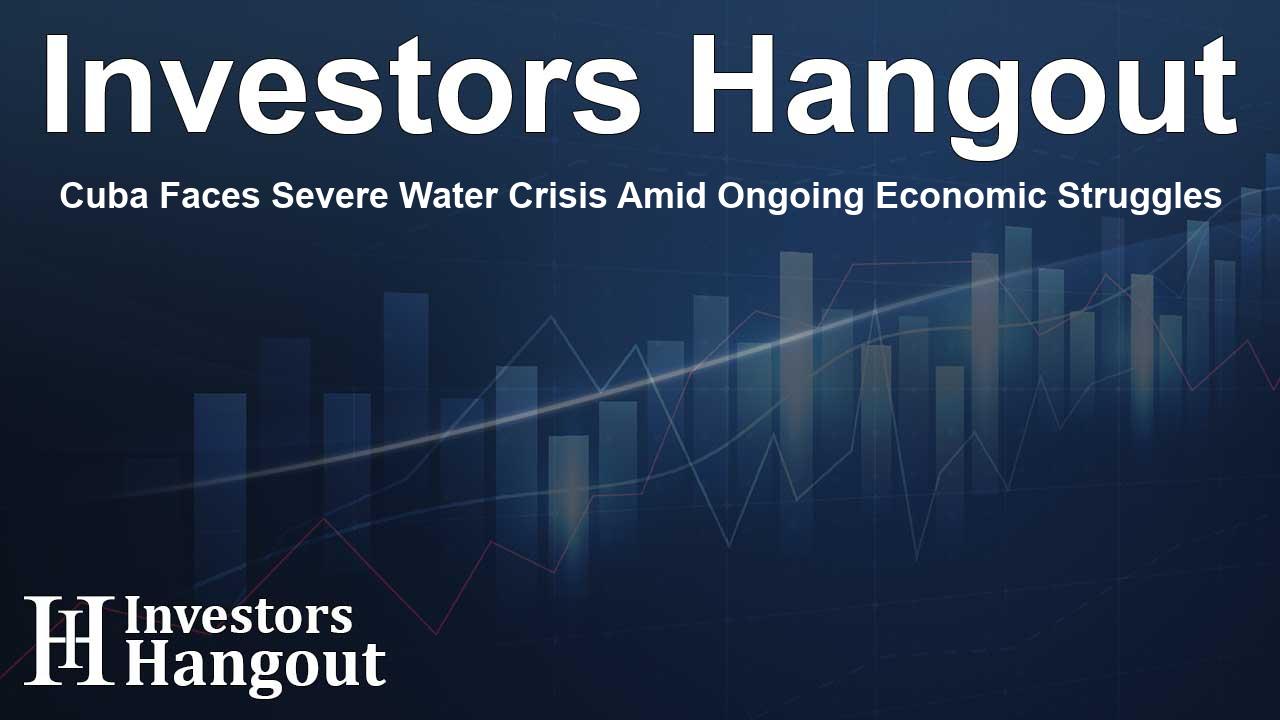Cuba Faces Severe Water Crisis Amid Ongoing Economic Struggles

Cuba Faces Severe Water Crisis Amid Ongoing Economic Struggles
The situation in Cuba regarding water shortages has reached a critical point, particularly in the capital city of Havana. Over 600,000 residents, which accounts for more than 1 out of 20 citizens on the island, are grappling with significant water supply issues. This crisis is compounded by existing shortages in food, fuel, and electricity, creating an environment of rising frustration and despair.
Extent of the Water Shortages
Officials have reported that Havana is the hardest-hit area, but the issue is widespread, affecting many of the country's largest cities. Reports indicate that over 30,000 residents in these cities are currently living without access to a reliable water supply. The scale of the problem highlights a systemic issue that goes beyond simple supply and demand.
The Root Causes of the Crisis
The persistent water shortages are largely attributed to the country's aging and crumbling infrastructure, which requires urgent repairs and upgrades. Additionally, there is a chronic shortage of fuel, further complicating the ability to deliver water effectively. These challenges are the result of a long-standing economic crisis that has left Cuba struggling to support basic services.
Maria's Story: A Personal Experience
Rachel Trimiño, a resident of the relatively upscale Vedado neighborhood in Havana, expressed her frustration with the situation. "All of the streets are full of leaking pipes, clean running water ... but nothing in our homes," she lamented. Her experience illustrates the disconnect between available resources and the inaccessibility faced by ordinary Cubans. It’s clear that the crisis is impacting daily life, and residents like Rachel are feeling the effects firsthand.
Challenges in Addressing the Water Crisis
Addressing the water shortages proves to be a daunting task for local authorities. Spare parts for outdated water infrastructure are difficult to procure, and this scarcity hampers immediate repair efforts. Furthermore, the lack of fuel limits the potential of cistern trucks that could otherwise deliver emergency water supplies to neighborhoods in need.
Electricity Cuts and Their Impact
The regular power outages exacerbate the crisis, making it even harder to deliver water efficiently. Pedro Martino, a local resident working with a church group, shared, "When they cut off power, we can't give water. One thing depends on the other, and that's the game we play." This interdependence of utilities has placed residents in a precarious situation where they are continuously at the mercy of inadequate infrastructural support.
Public Response and Social Unrest
The ongoing frustrations have led to isolated protests among citizens who are unable to endure the increasing shortages in the sweltering summer heat. As tensions rise, it is evident that the populace is nearing their breaking point. With each passing day, the need for solutions becomes more pressing, and communities are increasingly vocal about their demands for change.
The Broader Economic Context
The current crisis is also a symptom of a far-reaching economic catastrophe that Cuba has been facing for years. Factors such as the aftermath of the COVID-19 pandemic, stringent U.S. sanctions, and a struggling state-run economy marred by inefficiencies have collectively contributed to one of the worst economic situations in recent decades. This scenario has not only propelled widespread frustrations but has also led to a historic wave of migration as Cubans seek better opportunities abroad.
Conclusion
As Cuba navigates through this multifaceted crisis, the government and citizens alike are left grappling with significant challenges. The water shortage is more than a simple lack of resources; it represents a complex intersection of historical, economic, and infrastructural failures that need to be urgently addressed. The pathway to recovery and improvement remains uncertain, but recognizing and elevating the plight of the residents is a vital step towards a solution.
Frequently Asked Questions
What caused the water shortages in Cuba?
The water shortages are primarily due to aging infrastructure, a lack of fuel for repairs and deliveries, and economic difficulties that have hindered growth and maintenance efforts.
How many people are affected by the water crisis in Cuba?
Approximately 600,000 people, or more than 1 in 20 residents, are currently experiencing water supply issues across the island.
What are residents doing to cope with the water shortages?
Some residents are relying on church groups and community organizations for small quantities of water, although these supplies are limited and dependent on power and fuel availability.
How has the economic situation in Cuba contributed to this crisis?
The economic downturn, driven by the pandemic, sanctions, and mismanagement, has severely impacted infrastructure maintenance and resource availability, exacerbating the water crisis.
What can be done to address the water crisis in Cuba?
Urgent attention is needed for infrastructure repairs, procurement of spare parts, fuel supply for water delivery, and transformative economic reforms to stabilize the country.
About The Author
Contact Dylan Bailey privately here. Or send an email with ATTN: Dylan Bailey as the subject to contact@investorshangout.com.
About Investors Hangout
Investors Hangout is a leading online stock forum for financial discussion and learning, offering a wide range of free tools and resources. It draws in traders of all levels, who exchange market knowledge, investigate trading tactics, and keep an eye on industry developments in real time. Featuring financial articles, stock message boards, quotes, charts, company profiles, and live news updates. Through cooperative learning and a wealth of informational resources, it helps users from novices creating their first portfolios to experts honing their techniques. Join Investors Hangout today: https://investorshangout.com/
The content of this article is based on factual, publicly available information and does not represent legal, financial, or investment advice. Investors Hangout does not offer financial advice, and the author is not a licensed financial advisor. Consult a qualified advisor before making any financial or investment decisions based on this article. This article should not be considered advice to purchase, sell, or hold any securities or other investments. If any of the material provided here is inaccurate, please contact us for corrections.
